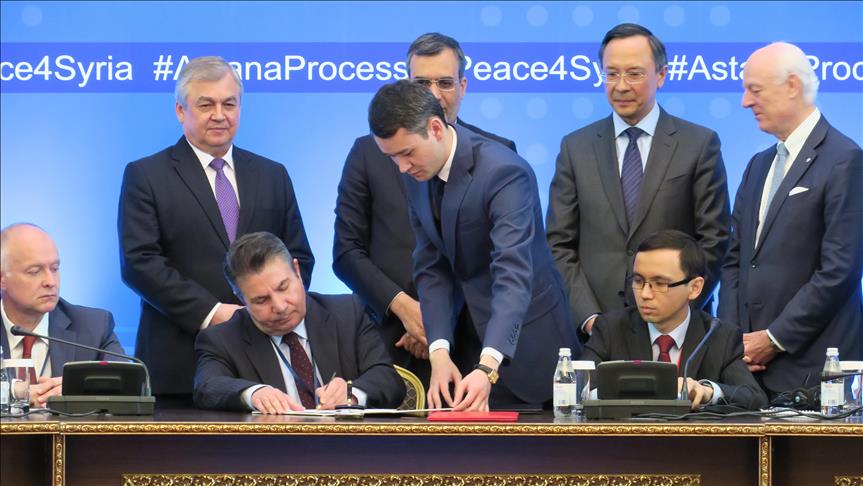Syria 'de-escalation zones' deal enters into force
'De-escalation zones' will be closed to US-led coalition aircraft, says Russia's special envoy to Syria
 Russian President Putin's special envoy to Syria Alexander Lavrentiev (L-2), Kazakh Foreign Minister Kairat Abdrakhmanov (rear R-2), UN Special Envoy for Syria Staffan de Mistura (R) and Iranian deputy foreign minister Hossein Jaberi Ansari (rear C) attend a signing of a memorandum to establish de-escalation zones in Syria during the fourth round of Syria peace talks in Astana, Kazakhstan on May 4, 2017.
Russian President Putin's special envoy to Syria Alexander Lavrentiev (L-2), Kazakh Foreign Minister Kairat Abdrakhmanov (rear R-2), UN Special Envoy for Syria Staffan de Mistura (R) and Iranian deputy foreign minister Hossein Jaberi Ansari (rear C) attend a signing of a memorandum to establish de-escalation zones in Syria during the fourth round of Syria peace talks in Astana, Kazakhstan on May 4, 2017.
ASTANA, Kazakhstan
A deal signed by Turkey,
According to the agreement signed by the three guarantor countries in the Kazakh capital, Astana, on Thursday, the zones will cover the city of Idlib and certain parts of Latakia, Homs, Aleppo and Hama as well as Damascus, Eastern Ghouta, Daraa and Quneitra.
The "de-escalation zones" will be closed to U.S.-led coalition aircraft, the head of Russian delegation to the Astana talks, Alexander Lavrentyev was quoted as saying Friday according to TASS news agency.
"As for their [coalition] actions in the de-escalation zones, as of now, all of those zones are closed to their flights," Russia's special envoy to Syria told journalists in Astana.
He added that although this was not part of the memorandum, the guarantors would ensure that the coalition forces would not fly over the "de-escalation zones" "with or without notification".
"As guarantors, we will thoroughly monitor all actions along this course," Lavrentyev said, adding the U.S-led coalition would be able to operate only against the Daesh targets "near Raqqah and other settlements, near the Euphrates and Deir
Described by Russian Foreign Minister Sergey Lavrov as a significant step taken
The deal also aims at ensuring “emergent and continuous humanitarian aid” be sent to the regions concerned.
According to the accord, checkpoints will ensure the safe flow of humanitarian aid and provide secure passage for civilians. Observation points will monitor the cease-fire in the region.
Fighting against al-Qaeda and Daesh will continue.
Guarantors will continue to make efforts to include groups that are not a party to the cease-fire.
After two weeks, a joint working group will be set up by the guarantor countries to determine the borders of the zones in question.
Following the agreement, the U.S. said it "supports any effort that can genuinely de-escalate the violence in Syria".
The Astana talks, which were first convened in January, ran alongside the UN-backed discussions in Geneva.
Turkey, which backs the Syrian opposition, joined the regime's allies Russia and Iran in sponsoring the negotiations after the assault on the Syrian city of Aleppo in December.
Syria has been locked in civil war since March 2011.
According to the UN, around 400,000 people have died in the conflict while half the population has been driven away from their homes.
Anadolu Agency website contains only a portion of the news stories offered to subscribers in the AA News Broadcasting System (HAS), and in summarized form. Please contact us for subscription options.








